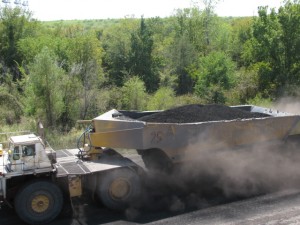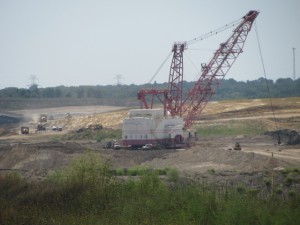Texas Puts Luminant Mining Under Closer Financial Scrutiny

Dave Fehling / StateImpact
Coal on its way to Luminant's Big Brown power plant in Freestone County
Last fall, a newspaper article caught the eye of staff members at the Texas Railroad Commission, which regulates coal mining.
“Analysts: TXU-Luminant bankruptcy possible next year,” read a headline in the Dallas Morning News.
That caused concern at the Railroad Commission because a related company, Luminant Mining, is on the hook to cover around $1 billion to restore Texas land damaged by strip mining for coal.
Luminant — operator of eight of the 20 coal mines in Texas — maintains it can cover the cost of reclamation despite any possible reorganization under Chapter 11 of the United States Bankruptcy Code.
The newspaper article would eventually be mentioned in an official order from the Railroad Commission that, in part, called for tighter monitoring of Luminant’s financial status.
As the Railroad Commission’s spokesperson Ramona Nye explained in an email to StateImpact, Luminant Mining is “now required to submit quarterly unaudited statements to the Commission and certify that they continue to meet the financial requirements of the Texas Coal Mining Regulations.”

Dave Fehling / StateImpact
Strip mining shovel at Big Brown Mine
Will the Money Be There?
But some environmental groups are warning that the Railroad Commission is not doing enough to protect Texas taxpayers from having to pick up the bill for restoring thousands of acres of land damaged by strip mining.
“We’ve asked the Railroad Commission to take a really good, hard look at this and begin an investigation because the risks are high to the state,” said Smitty Smith, Texas director of the industry watchdog group, Public Citizen.
The group worked with the Sierra Club in what the club’s Al Armendariz said was a six-month review of financial and regulatory documents.
“It doesn’t appear that any money has been set aside that Texas regulators could use in case the company goes bankrupt or they walk away from any of these mines,” Armendariz told StateImpact. Armendariz is with the Sierra Club’s Beyond Coal campaign.
Questioning ‘Self-Bonding’

Dave Fehling / StateImpact
Luminant's billboards on reclaimed land at the Big Brown Mine
At the heart of the two groups’ concern is what’s called “self-bonding.” Under federal law, mining companies must post bonds as a form of insurance to cover the cost of reclamation in case the companies run into financial trouble. Instead of using an outside company to provide the bonds, mining operators in Texas are allowed to self-bond. Some coal states don’t accept self-bonding.
Texas has approved Luminant Mining’s self-bonding. The self-bond’s “third party guarantor” is a sister company, Luminant Generation. It’s the power plant company that burns the coal from Luminant Mining.
The environmentalists say they’re worried that those power plant assets might also be claimed by other creditors, jeopardizing the funds Texas might recover to pay for reclamation.
“We would like the Railroad Commission to begin an investigation of Energy Future Holdings to determine whether the Luminant assets really are free and clear,” said Armendariz. Energy Future Holdings is Luminant’s parent company.
Environmentalists Call SEC Filings ‘Smoking Gun’
Energy Future Holdings has explained in annual reports to the United States Securities and Exchange Commission that the company faces creditworthiness requirements for different regulators in Texas, among them the Railroad Commission. For years, the reports said that “we believe we will have adequate liquidity to satisfy such requirements” or “we believe we would have adequate liquidity capacity and/or financing capacity to satisfy such requirements.”
But then, in a 2012 report, that line disappeared.
“It was the smoking gun,” said Public Citizen’s Smitty Smith.
‘No Matter What’ Luminant Says It Will Pay
A media liaison for Energy Future Holdings, Allan Koenig, would not comment specifically about the line that disappeared. But in a more general email, the company said, “We fully satisfy the bonding requirements of the Railroad Commission of Texas for our coal mines, which means that our reclamation obligations are guaranteed. No matter what happens in a potential restructuring process, Luminant Mining will continue to satisfy all of its reclamation and environmental obligations.”
The company also points out that it has reclaimed some 73,000 acres of strip mined land in Texas, planting 33 million trees and winning national and state recognition for its efforts.
Last year, the Sierra Club sued Energy Future Holdings and Luminant Generation for alleged air pollution violations at the Big Brown power plant in Freestone County.
